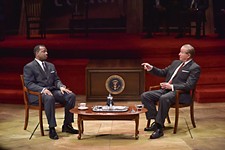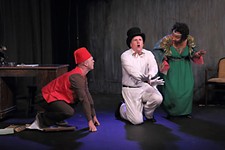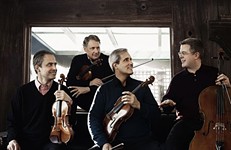The Unexpected Guest
Local Arts Reviews
Reviewed by Robi Polgar, Fri., July 5, 2002
The Unexpected Guest: Out of Time
Auditorium on Waller Creek,
through July 20
Running time: 2 hrs, 20 min
Sadly, third time is not always the charm, even for a gifted director like Johanna Whitmore, who has now helmed her third murder mystery for Different Stages. Following well-received outings with Agatha Christie's Black Coffee (1996) and Ladies in Retirement (1999), Whitmore's take on The Unexpected Guest comes a cropper with what may have seemed, initially, a good idea.
"Comes a cropper." No one really talks that way now, do they? Nor does one refer to oneself as "one," these days, either. But that is the style of the language in the world of Agatha Christie's characters, a world still keeping step with the earlier parts of the 20th century. Whitmore has tried to translate the play into a contemporary setting -- modern Maine to be exact -- but hasn't translated the text, rooted in the phraseology and linguistic mannerisms of the past. Rarely do her actors sound as if they are portraying modern characters, no matter the potential behavioral connections between then and now. Further hampering efforts at modernization, her designers haven't evoked a clear rendering of modern times; the ambiguous sets and costumes hail from the attics of an indeterminate, catchall, ready-for-the-stage era. Inexactitude reigns in a stilted and, ultimately, wooden production.
Few members of the cast make their lines sound natural to the modern ear. Gareth Maguire is a solid presence on the stage as Julian Farrar, a candidate running for the local Congressional seat (an Irishman turned naturalized American here, accommodating his brogue, perhaps?). Gay Gaughin-Hurst tells some good tales as the family matriarch, Mrs. Warwick, although her limp seems forced and inconsistent. And why is she allowed a crusty English accent, as is Steven Fay as the creepy/slimy male attendant, Henry Angell? Charles Glenn Hobby, as the titular guest Michael Starkwedder, looks the most Maine-like: sporting a 1970s dry look and stubble, and wearing a checked flannel shirt and work boots. But the words in his mouth, despite his fine voice, sound stale. He's out of place, as are the cellular phone on Weldon Phillips' Inspector Thomas and the Walgreen's-issue writing pad and the orange plastic-handled scissors, in a setting -- and story -- that can't make the leap to the 21st century.
Why not revel in Christie's era? Then the melodramatic twists and turns would entertain because they sound honest, not garner laughs because they sound so weirdly yanked out of the past. Or why not do a wholesale reconsideration of the text and design, to ensure an effective updating? The sound design by George Spelvin (a made-up name traditionally plopped into playbills to give anonymity to the real person responsible for some element of stage work) offers compelling evidence of best-laid plans half-laid: The modern-day cordless phone rings, but it is the ring of a phone from a time before there were cordless phones, from a time when one needn't find an electrical outlet in which to plug one's phone. The disconnectedness between the classic sound and the modern prop echoes the dissonance between Agatha Christie's moody original and this awkward modern translation.










